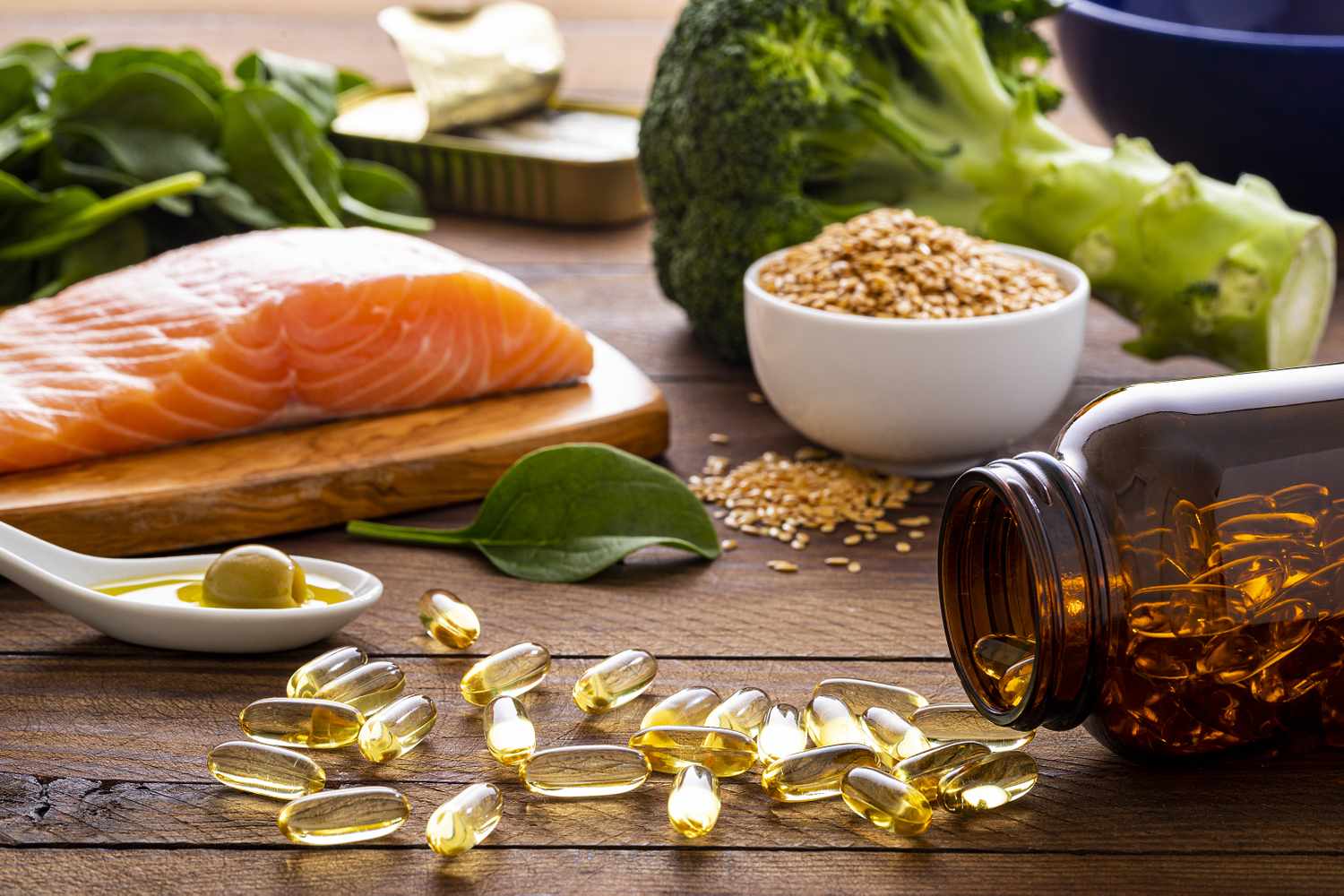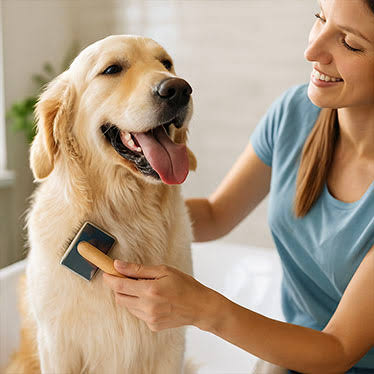Dog Food and Supplements to Reduce Shedding and DanderIf you're an allergy sufferer living with a dog, you've probably wondered whether changing your pet's diet could help reduce allergens in your home. While no diet can completely eliminate dog dander, the right nutrition can significantly improve your dog's skin and coat health, leading to less shedding and fewer airborne allergens. In this comprehensive guide, we'll explore how specific foods and supplements can make a real difference for both you and your furry friend. 
Proper nutrition is the foundation of healthy skin and reduced dander production
How Diet Affects Dander ProductionDander consists of tiny flakes of dead skin cells that dogs naturally shed. These microscopic particles carry proteins that trigger allergic reactions in sensitive individuals. While diet doesn't directly reduce the production of allergen proteins, it plays a crucial role in maintaining healthy skin that sheds less frequently. When your dog's skin is well-nourished and properly hydrated, it produces fewer dry, flaky particles. High-quality nutrition strengthens the skin barrier, reduces inflammation, and promotes a healthier coat cycle. This means less excessive shedding and fewer allergen-carrying particles floating around your home. The connection between nutrition and skin health is straightforward: just as poor diet affects human skin, dogs with nutritional deficiencies often develop dry, irritated skin that produces more dander. By optimizing your dog's diet, you're investing in their skin health and, by extension, creating a more comfortable environment for yourself. ↑ Back to Table of ContentsKey Nutrients That Support Skin and Coat HealthUnderstanding which nutrients benefit your dog's skin can help you make informed choices about their food and supplements. 
Omega-3 fatty acids are essential for healthy skin and coat
Omega-3 Fatty AcidsOmega-3 fatty acids are perhaps the most important nutrients for reducing shedding and dander. These beneficial fats, commonly found in fish oil and marine sources, have anti-inflammatory properties that support healthy skin from the inside out. They help maintain the skin's natural moisture barrier, preventing dryness and excessive flaking. Research shows that omega-3s, particularly EPA and DHA found in fish oil, can significantly improve coat quality and reduce skin inflammation. Dogs receiving adequate omega-3s typically show improvements within 6-8 weeks, with shinier coats and noticeably reduced shedding. Omega-6 Fatty AcidsWhile omega-3s get most of the attention, omega-6 fatty acids are equally important for skin health. These fats, found in sources like chicken fat and plant oils, work alongside omega-3s to maintain the skin's protective barrier. The key is balance—a proper ratio of omega-6 to omega-3 (typically around 5:1 to 10:1) promotes optimal skin health. High-Quality ProteinsProteins are the building blocks of healthy skin and coat. Since hair is primarily made of protein (keratin), adequate high-quality protein in your dog's diet is essential for maintaining a strong, healthy coat. Look for whole meat sources like chicken, beef, fish, or novel proteins rather than by-products or low-quality fillers. Essential VitaminsSeveral vitamins play critical roles in skin health:
Minerals: Zinc and MoreZinc is particularly important for skin health, supporting cell regeneration and reducing inflammation. Combined with other minerals like selenium, it helps maintain a healthy coat and reduce excessive shedding. Dogs with zinc deficiencies often show symptoms like dull coats, hair loss, and increased dander production. ↑ Back to Table of ContentsBest Dog Foods for Reducing DanderWhen selecting a dog food to minimize dander production, look for these key features: Premium Ingredients MatterChoose foods with named meat sources as the first ingredient (like "chicken" or "salmon" rather than "meat meal"). Avoid foods heavy in cheap fillers such as corn, wheat, or soy, which offer little nutritional value and can sometimes trigger sensitivities.
Pro Tip: Read ingredient labels carefully. The first five ingredients typically make up the majority of the food's composition, so they should be high-quality, recognizable ingredients.
Limited Ingredient DietsIf your dog has food sensitivities that contribute to skin issues, limited ingredient diets can be beneficial. These formulas use fewer components, making it easier to identify and avoid potential triggers while still providing complete nutrition. Recommended Food TypesFish-Based Formulas: Foods containing salmon, whitefish, or other fish as primary ingredients naturally provide high levels of omega-3 fatty acids. These are excellent choices for dogs with skin issues. Novel Protein Diets: For dogs with protein sensitivities, foods featuring less common proteins like duck, venison, or even kangaroo can reduce inflammatory responses that worsen shedding. Grain-Free Options: While not necessary for all dogs, some benefit from grain-free formulas, especially if they have sensitivities to wheat or corn that manifest as skin problems. Hypoallergenic Formulas: Specifically designed for sensitive dogs, these foods use hydrolyzed proteins (broken down into smaller molecules) that are less likely to trigger reactions. What to Look For on Labels
Supplements to Reduce Shedding and DanderEven with high-quality food, targeted supplements can provide additional benefits for dogs prone to excessive shedding and dander production. Fish Oil SupplementsFish oil is the gold standard supplement for skin and coat health. It provides concentrated omega-3 fatty acids (EPA and DHA) that many dog foods don't contain in therapeutic amounts. When choosing fish oil:
Typical Dosing: Generally 20-50 mg of combined EPA/DHA per pound of body weight daily, but always consult your veterinarian for specific recommendations. Coconut OilCoconut oil contains medium-chain fatty acids that can benefit skin health when used both internally and topically. It helps moisturize dry skin and may reduce inflammation. Start with small amounts (1/4 teaspoon for small dogs, 1 teaspoon for large dogs) and gradually increase to avoid digestive upset. Probiotics for Skin HealthThe connection between gut health and skin health is increasingly recognized. Probiotics support a balanced gut microbiome, which in turn can reduce systemic inflammation that affects the skin. Studies suggest that dogs taking probiotics designed specifically for canines may experience reduced skin irritation and improved coat quality. Biotin and B-Complex SupplementsBiotin (vitamin B7) is specifically associated with healthy hair and skin. B-complex supplements can address deficiencies that lead to poor coat quality and increased dander. Specialized Skin & Coat FormulasMany manufacturers offer comprehensive supplements combining multiple beneficial ingredients:
These all-in-one formulas can be convenient and cost-effective compared to purchasing multiple individual supplements. Important Supplement Guidelines
Foods to AvoidCertain ingredients can worsen skin problems and increase shedding: Low-Quality FillersAvoid foods heavy in corn, wheat, and soy used as cheap protein substitutes. These ingredients provide poor nutritional value and can trigger sensitivities in some dogs, leading to increased inflammation and skin problems. Artificial AdditivesArtificial colors, flavors, and preservatives may contribute to skin irritation in sensitive dogs. Choose foods with natural preservatives like mixed tocopherols (vitamin E) instead. Common AllergensWhile any protein can potentially cause reactions, beef, dairy, chicken, and wheat are among the most common food allergens in dogs. If your dog has undiagnosed food allergies contributing to their skin issues, these ingredients might worsen shedding and dander production. Excessive Treats and Table ScrapsEven if your dog's main food is high-quality, excessive treats or table scraps can throw off their nutritional balance. Many commercial treats are nutritionally empty and can contribute to skin problems. Limit treats to no more than 10% of your dog's daily caloric intake. ↑ Back to Table of ContentsHow Long Until You See ResultsManaging expectations is important when changing your dog's diet or starting supplements. Skin cells take time to regenerate, and the hair growth cycle doesn't change overnight. Realistic Timeline
Consistency Is KeyThe most important factor in seeing results is consistency. Switching foods frequently or giving supplements sporadically won't produce the desired effects. Stick with your chosen diet and supplement regimen for at least 8 weeks before deciding whether it's working. Tracking ProgressKeep a simple journal noting:
This record helps you and your veterinarian assess whether the dietary changes are beneficial. ↑ Back to Table of ContentsAdditional Tips for Maximum BenefitDiet and supplements work best as part of a comprehensive allergen-reduction strategy. 
Regular grooming complements proper nutrition for best results
Combine with Regular GroomingEven the best diet can't replace regular brushing and bathing. Brush your dog at least 2-3 times weekly (daily during heavy shedding seasons) to remove loose hair and dander before it becomes airborne. Use this as an opportunity to check their skin condition. Hydration MattersEnsure your dog always has access to fresh, clean water. Proper hydration is essential for healthy skin—dehydrated dogs produce more dander. Consider Environmental FactorsDiet isn't the only factor affecting your dog's skin. Low humidity, excessive bathing with harsh shampoos, and environmental allergens can all contribute to skin problems. Use a humidifier in dry climates and choose gentle, hypoallergenic shampoos designed for dogs. Consult Your VeterinarianBefore making significant dietary changes, especially if your dog has underlying health conditions, consult your veterinarian. They can:
Some skin problems that appear to be simple dryness may actually require medical treatment, so professional guidance is valuable. ↑ Back to Table of ContentsConclusionWhile no diet can completely eliminate dog dander or make any breed truly hypoallergenic, proper nutrition significantly reduces shedding and improves skin health, creating a more comfortable environment for allergy sufferers. By focusing on high-quality foods rich in omega-3 fatty acids, providing essential vitamins and minerals, and supplementing strategically, you can minimize the allergen load your dog produces. Remember that dietary changes take time to show results—give your chosen approach at least 8-12 weeks before evaluating its effectiveness. Combine good nutrition with regular grooming, proper hydration, and other allergen-reduction strategies for the best outcomes. The investment in your dog's nutritional health pays dividends not only in reduced allergy symptoms for you but also in your pet's overall wellbeing, energy levels, and quality of life. A dog with healthy skin and a beautiful coat is a happier dog—and that makes for a happier home for everyone. Ready to reduce allergens in your home? Explore our other articles on managing dog allergies, including guides to hypoallergenic shampoos, grooming tips for allergy sufferers, and the best air purifiers for pet owners. Frequently Asked QuestionsQ: Can dog food really reduce allergies? A: Dog food doesn't reduce allergies directly, but it can significantly decrease the amount of dander your dog produces. By improving skin health through proper nutrition, you reduce the number of allergen-carrying skin particles released into your environment. Q: How long does it take for diet to affect dander production? A: Most dogs show noticeable improvements within 6-12 weeks of starting a high-quality diet or supplement regimen. Skin cell turnover takes time, so patience and consistency are essential. Q: What's the best supplement for dog dander? A: Fish oil supplements containing omega-3 fatty acids (EPA and DHA) are the most effective single supplement for reducing dander and improving coat health. Look for high-quality, dog-specific formulas with third-party testing. Q: Should I consult a vet before changing my dog's diet? A: Yes, especially if your dog has existing health conditions or you're making significant dietary changes. Your veterinarian can rule out medical causes of excessive shedding and recommend the most appropriate diet for your dog's specific needs. Q: Are grain-free diets better for reducing dander? A: Not necessarily. Grain-free diets benefit some dogs with specific sensitivities, but grains aren't inherently problematic for skin health. Focus on overall food quality and appropriate nutrient content rather than simply avoiding grains. Q: Can I give my dog human fish oil supplements? A: While human fish oil isn't toxic to dogs, dog-specific formulations are preferable because they're dosed appropriately for canines and often contain vitamin E to prevent oxidation. Always consult your vet before giving human supplements to your dog. Q: Will changing my dog's diet eliminate my allergies completely? A: Unfortunately, no. While improved nutrition reduces dander production, it cannot eliminate allergens entirely. Dietary changes should be part of a comprehensive allergy management strategy that includes regular grooming, cleaning, and possibly air filtration. 🐾 Struggling with Pet Allergies? Find the Right Breed for YouManaging dog allergies goes beyond diet and supplements. If you're considering adding a new furry friend to your family or want to explore breeds that might be better suited for allergy sufferers, our interactive breed selector can help you make an informed decision. Get personalized breed recommendations based on your lifestyle and allergy needs! References
Medical Disclaimer: This article is for informational purposes only and does not constitute veterinary medical advice. Always consult with a licensed veterinarian before making significant changes to your dog's diet or starting any supplement regimen, especially if your dog has existing health conditions or is taking medications.
| |
|
| |
| Переглядів: 132 | | |
| Total comments: 0 | |
